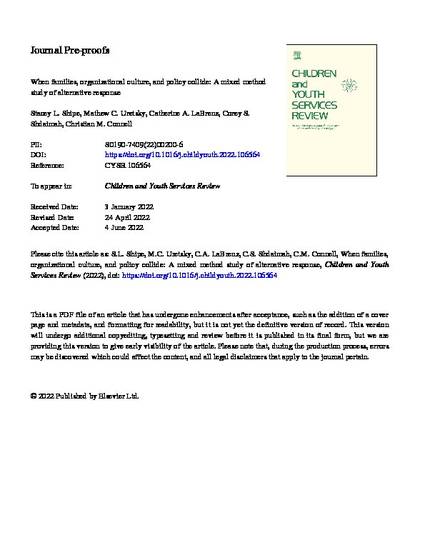
- Social work with youth,
- Youth -- Mental health services,
- Young adults -- Mental health services,
- Social work with children
Objective Alternative response (AR) is a family-centered, preventative approach for child protection systems. This study first examined what family and case factors predicted re-investigation and then explored which organizational factors influence caseworker and agency implementation of AR. Method Using administrative data from child protection reports, AR families (N = 9,959) and traditional response (TR) families (N = 13,974) were followed for 18 months to determine re-investigation rates using multilevel modeling where families were nested in county of residence. Four focus groups with 14 participants were conducted to discuss the quantitative findings, organizational culture, and implementation of AR. Results AR families had lower odds of re-investigation; males and younger children also had lower odds. Families with multiple children, prior investigations, receipt of Medicaid, and medium/high risk had higher odds of re-investigation. AR caseworkers provided insights regarding the intersection of family factors, organizational culture and support, and agency implementation of AR. Although participants supported AR, their ability to implement it was influenced by agency support and availability of resources to carry out the basic requirements of the policy. A clear distinction in responses emerged between those who held dual cases versus those holding only AR cases. Conclusion Although AR reduces the odds of re-investigation for low-risk families and was endorsed by caseworkers, AR policy in practice is complex and requires further evaluation, particularly from the perspective of AR caseworkers who faced implementation hurdles.
© 2022 Elsevier Ltd.

This is the author’s version of a work that was accepted for publication in Children and Youth Services Review. Changes resulting from the publishing process, such as peer review, editing, corrections, structural formatting, and other quality control mechanisms may not be reflected in this document. Changes may have been made to this work since it was submitted for publication. A definitive version was subsequently published in Children and Youth Services Review and is located here: https://doi.org/10.1016/j.childyouth.2022.106564